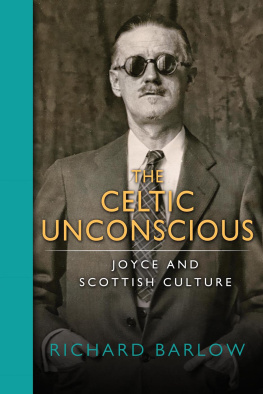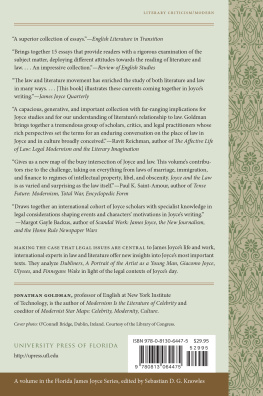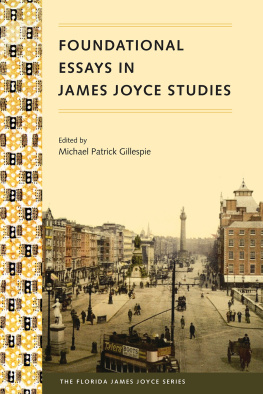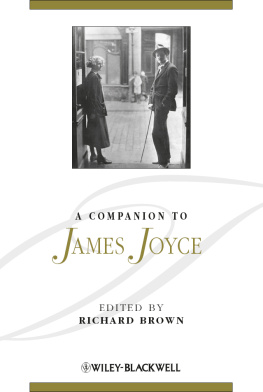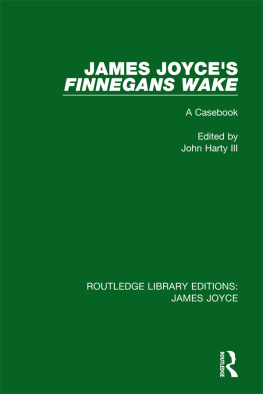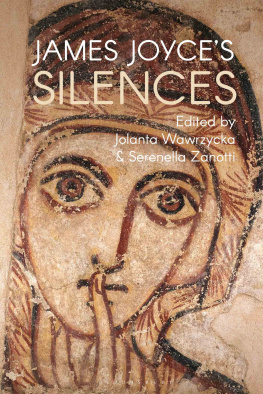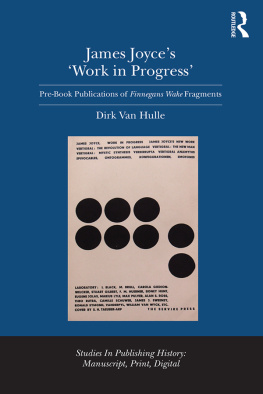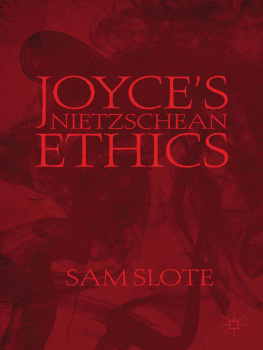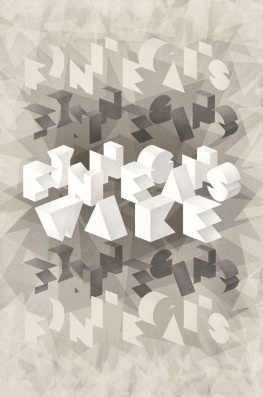
THE CELTIC UNCONSCIOUS
THE CELTIC UNCONSCIOUS

Joyce and Scottish Culture
RICHARD BARLOW
University of Notre Dame Press
Notre Dame, Indiana
University of Notre Dame Press
Notre Dame, Indiana 46556
www.undpress.nd.edu
Copyright 2017 by University of Notre Dame
All Rights Reserved
Published in the United States of America
Library of Congress Cataloging-in-Publication Data
Names: Barlow, Richard, 1983 author.
Title: The Celtic unconscious : Joyce and Scottish culture / Richard Barlow.
Description: Notre Dame : University of Notre Dame Press, 2017. |
Includes bibliographical references and index.
Identifiers: LCCN 2016049591 (print) | LCCN 2017005365 (ebook) |
ISBN 9780268101015 (hardback) | ISBN 0268101019 (hardcover) |
ISBN 9780268101039 (pdf) | ISBN 9780268101046 (epub)
Subjects: LCSH: Joyce, James, 1882-1941Criticism and interpretation. |
English literatureScottish authorsInfluence. | IrelandIn literature. |
ScotlandIn literature. | BISAC: LITERARY CRITICISM /
European / English, Irish, Scottish, Welsh.
Classification: LCC PR6019.O9 Z5256816 2017 (print) |
LCC PR6019.O9 (ebook) |
DDC 823/.912dc23
LC record available at https://lccn.loc.gov/2016049591
ISBN 9780268101046
This paper meets the requirements of ANSI/NISO Z39.48-1992
(Permanence of Paper).
This e-Book was converted from the original source file by a third-party vendor. Readers who notice any formatting, textual, or readability issues are encouraged to contact the publisher at .
Dialogue. 1980. Lilac Doorway U.S.A. Time: Spring.
She: (laying aside a copy of How to Get Rid of Parasites) I have been thinking.
What was the name of that family that was always in trouble over there in Europia?
He: (seizes jug) Youre asking me.
She: The man had a wall eye, I think. Was it Wallenstein?
He: (replaces jug) Jucious!
She: Jucious! That was the name. I knew it had something to do with Scotland.
James Joyce, from a letter to Eugene Jolas, 1940; LI, 417
CONTENTS
A version of the first chapter appeared as Crotthers: Joyces Scots Fellow in Ulysses, Notes and Queries 57, no. 2 (2010): 23033. A short version of appeared in Joyces Burns Night, Papers on Joyce no. 17/18 (2011/2012): 279311. Part of the conclusion appeared as What Might James Joyce Have Made of 21st-century Scottish Independence?, Guardian, January 31, 2014. Im grateful to the editors of these publications.
Special thanks to Brian Caraher for his supervision and support during my time at Queens University Belfast and to Stephen Little and everyone at University of Notre Dame Press. Id also like to express my gratitude to Willy Maley for all his help over the last few years. Thanks to Niall Whelehan and Nicholas Allen for helpful advice on the manuscript. In the Joyce and Irish studies community my appreciation goes to John McCourt, Michael McAteer, David Dwan, Paul Fagan, and Laura Pelaschiar. Thanks also to Neil Murphy, C. J. Wee Wan-Ling, and Terence Dawson at the Division of English, Nanyang Technological University. I am grateful to QUB and NTU for funding different stages of this project, to Nicole Ong for proofreading the manuscript, and to Bob Banning for copyediting and valuable suggestions. Id also like to thank the anonymous readers who read my manuscript for University of Notre Dame Press. My friends and family in Aberdeen, Edinburgh, Limerick, Galway, London, and Singapore have put up with a lot of talk about Joyce over the years, so thanks to them. Above all, I would like to express my deepest thanks to Guinevere for her many years of help, encouragement, and support. This book would not have been written without her help.
This is dedicated to Niamh and Clodagh.
A lion beag s bheagan, mar a dh ith an cat an t-iasg.
CP | Joyce, James. Collected Poems. New York: Viking Press, 1957. |
CSD | Robinson, Mairi, ed. Concise Scots Dictionary. Edinburgh: Polygon at Edinburgh, 1999. |
CW | Joyce, James. The Critical Writings of James Joyce. Edited by Ellsworth Mason and Richard Ellmann. New York: Viking Press, 1959. |
D | Joyce, James. Dubliners. London: Penguin, 2000. |
FW | Joyce, James. Finnegans Wake. New York: Viking Press, 1939. Citations are made in the standard fashion, i.e., page number followed by line number. |
JJI | Ellmann, Richard. James Joyce. New York: Oxford University Press, 1959. |
JJII | Ellmann, Richard. James Joyce. Rev. ed. New York: Oxford University Press, 1982. |
LI, LII, LIII | Joyce, James. Letters of James Joyce. Vol. I, edited by Stuart Gilbert. New York: Viking Press, 1957. Vols. II and III, edited by Richard Ellmann. New York: Viking Press, 1966. |
OCPW | Joyce, James. Occasional, Critical, and Political Writings. Edited by Kevin Barry. Oxford: Oxford University Press, 2000. |
OED | Online edition of the Oxford English Dictionary. |
P | Joyce, James. A Portrait of the Artist as a Young Man. London: Penguin, 2000. |
PE | Joyce, James. Poems and Exiles. London: Penguin, 1992. |
U | Joyce, James. Ulysses. Edited by Hans Walter Gabler. Corrected text. New York: Random House, 1986. Citations are made in the normal way: episode number followed by line number. |
Over the past few decades the critical conception of James Joyce as a detached, apolitical, and denationalized writer has been abandoned. Works such as Emer Nolans James Joyce and Nationalism (1995), Vincent Chengs Joyce, Race, and Empire (1995), Trevor Williamss Reading Joyce Politically (1997), and Andrew Gibsons Joyces Revenge (2002) have placed Joyces work firmly within political contexts and into the vexed debates of postcolonial discourses. According to Leonard Orr, it will surprise most readers to note how recent the concept of a political Joyce is. Critics of the 1950s through 1970s treated Joyce as either entirely disinterested in politics or having only a superficial understanding [of] matters outside of literature and aesthetics (Orr, 1). Furthermore, Joyces specific cultural and historical contexthis background in late nineteenth- / early twentieth-century Irelandhas been given much greater attention. Gregory Castle has commented that Joyces Irishness, when it is not subordinated to considerations of style and narrative, frustrates those critics who wish to read his work in the context of an Anglo-European tradition of modernism that eschews the local in favor of a pan-historical universalism (Modernism, 208).
Naturally, as part of this relatively new presentation of Joyce as a writer engaged with the themes of imperialism, colonialism, and Irish history, a great deal of attention has been paidin theoryto Joyces commentary on Britain. Unfortunately, what this has almost always meant in practice is the production of work on Joyce and England. See for example the absence of any real deconstruction of the term Britain in Andrew Gibson and Len Platts
Next page
